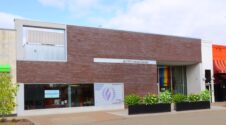Addressing Southeast Michigan’s HIV Crisis: Why This $2 Million CDC Grant Benefiting Michigan Is So Important
CHAG and LGBT Detroit partner to help at-risk LGBTQ+ people in Detroit

The city of Detroit comprises six percent of Michigan’s population, but 31 percent of the state’s reported cases of HIV infection, according to 2020 data from the Michigan Department of Health and Human Services. And while 0.4 percent of the population of Detroit is made up of young men of color who have sex with men, they make up 38 percent of new HIV diagnoses. A $2 million grant awarded to Community Health Awareness Group Detroit (CHAG) by the Centers for Disease Control and Prevention (CDC) will enable the organization, in collaboration with LGBT Detroit, to target high-impact HIV prevention services to address the unique needs of this at-risk demographic. Barbara Locke, CHAG’s director of finance and prevention programs, called securing the grant “a partnership: CHAG in collaboration with LGBT Detroit and our primary care provider, Be Well Medical Center. It [is] just a good opportunity to provide so much needed service targeting a population hardest hit — most impacted — by HIV.” The grant, known as the Comprehensive High-Impact HIV Prevention Project for Young Men of Color Who Have Sex with Men, will be administered over five years and is funded by the CDC Division of HIV/AIDS Prevention. The services are available to young men of color (ages 13 to 34) who have sex with men and their partners, regardless of age, gender and race/ethnicity, residing in Detroit. “Receiving direct funding from the Centers for Disease Control and Prevention is a unique opportunity for an organization to respond to a particular issue directly,” Locke said. Direct funding was initially made possible through the efforts of members of Congress and allowed funds to go directly to minority-led or -serving organizations in response to the HIV/AIDS epidemic that was severely impacting communities of color. Locke explained that with this grant, CHAG would collaborate with LGBT Detroit to focus on many of the core social determinants of health, like access to quality healthcare and education, poverty and racism that put young men of color who have sex with men at increased risk. She also spoke of those core social determinants of health specific to Detroit addressed by this grant, including unstable housing, access to affordable housing, transportation barriers (which make it challenging to keep medical appointments) and a lack of social services. Social media, direct marketing and direct mail campaigns, avenues LGBT Detroit has found most effective in the past, will be used to promote the program. Their outreach to young men of color who have sex with men is already built into LGBT Detroit’s core program offerings: the Brother to Brother podcast; the Sex, Hookups and the Apps Tour, designed for HIV education; and LGBT Detroit’s signature Pride events, Cold as Hell and Hotter Than July. The outreach and recruitment components are just one example of how the overall program is designed to meet people where they are by people who best understand their needs. “Cultural competency is something that we've been sensitive about for many years,” said Curtis Lipscomb, executive director of LGBT Detroit. “We understand that how people receive treatment is based upon their comfort level.” He added that the way a person presents themselves — people of different genders, ages, etc. — often determines what they ask of a service provider and how they are treated. “We recognize that in the African American community, how people receive health care is unique, like many other types of people,” Lipscomb said, “and so we want to reduce that barrier so that you can enter a space [and] get that care knowing that there’s no shame: where you can express yourself in a manner that maybe you're not highly educated on the subject matter and still receive adequate care, and therefore your physical well-being is improved, and perhaps your mental health is also.” Funding will be used to increase prioritized rapid HIV testing, status awareness and accessibility to PrEP. Integrated testing and treatment for HIV, sexually transmitted infections and hepatitis C are also available, performed at CHAG’s on-site clinic, Livewell Detroit, powered by Be Well Medical Center. If needed, clients can also get a referral to Life Points, CHAG’s syringe services program. A core component unique to the program is a “status neutral approach” to HIV, part of the National HIV Strategy. “Previously, we would test somebody,” Locke said, “and if they came back HIV positive, we had many services available.” She named things like medical and non-medical case management. “But if you were HIV negative, we provided health education,” she said. “Back then, we [would] give you condoms and then hope for the best.” She compared it to a catch and release approach. Later, PrEP was added as an intervention with the potential to prevent the onset of HIV. “But this time, instead of ‘catch and release,’ this funding allows us to provide our clients with a higher level of service regardless of their status,” Locke said. Ongoing support is available to both HIV positive and HIV negative individuals. “We are re-engaging those that are HIV positive and out-of-care,” Locke said. “In this project, we have navigators in place to provide supportive services and link you with any of those particular needs that are preventing you from accessing PrEP.” Once accessed, the goal is to link the individual with services to support medication adherence and help with any other barriers to compliance. CHAG’s philosophy states that collaboration best meets client needs, not competition. “Even though we're funded to address this particular need,” Locke said, “the problem is more significant than any one organization can respond to. “In the partnership on this particular initiative with LGBT Detroit — a nationally recognized advocacy organization — addressing the needs of the LGBTQ+ population is essential,” she continued. “And we've partnered with that organization on several initiatives, including our COVID vaccine awareness project and other CDC program initiatives over the last five-plus years. No one entity can do it all because the problem is too great.” Lipscomb said he was “on cloud nine” about LGBT Detroit’s continuing relationship with CHAG. “I've known their leadership since 1992,” Lipscomb said. “We’ve worked on AIDS Walk Michigan through the city of Detroit intimately for years, so I'm proud that they believe that we are a solution. It's always good to know that when sister organizations believe that by working together, they succeed. And so I'm happy they chose us. Community Health Awareness Group is a true friend.”










